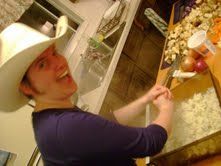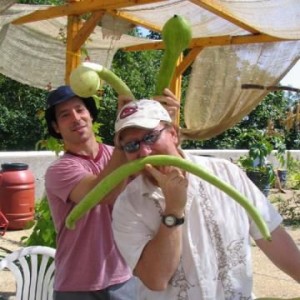-
The following post is written by Megan Thom who I interviewed in 2006 for Santropol Roulant’s Living Labs Project. The story she told me at the time stuck with me over the years and so I recently got back in touch with her to see if she would be interested in sharing it on Organization Unbound.
I burnt out in third year university. The nail in the coffin on top of school and work and everything else was the effort and time I’d put into organizing a day of panel discussions about ethical consumption. I booked the best minds of our university, matching them with on-the-ground activists in the community and a good smattering of ethical producers and consumer representatives. Organizing all these people to be in the same place at the same time, as well as booking the room, sourcing food, doing promotion and all those things that go into planning an event were overwhelming. When the day came everything was as ready as it could be – and only a handful of people showed up.
It wasn’t the fault of our promotion, we had done a good job of getting the word out. The real problem, if I was honest with myself, was that panel discussions are boring. They are especially boring if your target audience is university students, people who sit and listen and take notes all day for four years.
I realized then that sitting and listening almost never creates effective change. Change must be as its name suggests -constantly moving and shifting, engaging and re-engaging multiple actors and currents at all times. In order to engage people in creating change it must be dynamic, intriguing, joyful. In short, change must be fun.
Change must be fun not only for the target audience one wishes to reach, but even more vitally, change must be fun for the changemaker. In my burnt-out, disappointed and thoughtful state, I resolved that henceforth all activism I engaged in would involve at least one of my favourite activities: growing food, cooking food, eating food, bicycling and singing. All of these activities are inherently change-making in that they all have positive effects on our ecological, social and emotional environments. All of these activities are also fun. I figured that if I focused on these fun activities I would be both an effective agent of change and also a happy person. In fact, I would argue that one cannot be the former without also being the latter.
Soon after, I was hired to coordinate the Food Action Group of the University of Victoria Sustainability Project. At our very first meeting I wrote the name of the group in the centre of a mind map on the whiteboard, took one look at it and suddenly realized what the acronym would spell. Thinking fast, I drew an arrow and wrote “Food University Network” – F.U.N! The group took off.
 We played games and did inventive check-ins at our meetings. We laughed, we made new friends, we cooked and shared food together, we biked to farms and we sang a harvest-time version of the jazz classic “Summertime” at our 100-mile dinner, where we cooked food produced within 100 miles of our dining hall for 200 people in March. I was filled with joy and good food and I was coordinating a highly active, effective and enthusiastic group of young volunteers who were creating change in their community.
We played games and did inventive check-ins at our meetings. We laughed, we made new friends, we cooked and shared food together, we biked to farms and we sang a harvest-time version of the jazz classic “Summertime” at our 100-mile dinner, where we cooked food produced within 100 miles of our dining hall for 200 people in March. I was filled with joy and good food and I was coordinating a highly active, effective and enthusiastic group of young volunteers who were creating change in their community.There was still a significant amount of organizational work necessary to make these fun activities reach maximum change-making potential, but every event and activity brought me joy. I found joy in doing the things I love and in the relationships that grew among the organizers and participants. My food activism fed my body and soul equally.
This is the key of what Warren calls the Giving Field – that all participants in change-making give and receive gifts equally. In this case, like in many effective organizations, that gift is joy. Over my years of activism, I have found that change without joy is no change at all.
People rarely change their values or actions based on fear, guilt or even well-founded research. Effective activism engages people joyfully, through fun and creativity and movement and emotion. Laughter and a touch of absurdity go much farther towards creating positive change in the world than sitting and listening.
So my question to anyone who wants to creative change in their community is, what makes you happy? Focus on the activities and relationships that bring you joy, and then tease out the change-making potential. For every gift of joy you share, you will receive something that feeds you in return. If we embrace an ethic of joy and fun in our attempts to create change, the change can come to fuel both itself and us.
Back in the basement of the UVic Student Union Building, the Food University Network is wobbling around like chickens playing rock-paper-scissors, much to the bemusement of the neighbouring student organization.
“What are you doing?” one of them asks.
“We’re having F.U.N!” we reply.
Fun change = real change





6 Responses and Counting...
great, great post! thanks so much megan.
Excellent! I plan to forward it widely. Thanks, Megan.
Thanks Megan, nice one!!
Thanks Megan, nice one!!
Fun Change = Real Change; great title and soo very true. We take fun not serious enough and seriousness too serious. Serious is a mask, play is liberation. If you can play with something, it means you are free in it. Play is natures most natural learning system, offers learning at so many levels at the same time, that our sad educational system broke it up, so it could measure progress. We took fun out of change, because it promises not enough control and makes managers unhappy. And now in the internet age, where boredom is solved with one click, we need attractive revolutions that make change a happening you want to be a part of. “I only want to be part of the revolution, if I can dance in it” said Isabella Duncan. Your call to involve fun in change I see it happening everywhere. Take the Warriors without Weapons in Brazil. They use play in almost any step of community change. Or how flash mobbing is also a social comment on (lack of) community and a invitation to play and fun. Methods that are perhaps further developed in Occupy, which sadly might not have reached is full potential due to lack of fun.
I love the examples you give here, Floris. And I think the big challenge is to not get too stuck in form. An activity might be fun for a while, but after a while lose the spark that initially attracted us to it or it might be fun for one group and have quite the opposite experience for another. And I love the Isabella Duncan quote!